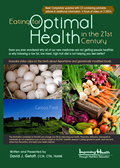NEW INSIGHTS ON pH REGULATION AND YOUR HEALTH
By
Byron J. Richards, CCN
October 16, 2010
NewsWithViews.com
An acid pH is associated with states of poor health, increased inflammation, and significantly increased risk for any disease of aging. Until now, we never had the tools to accurately measure cellular pH and what is causing it to change as well as the impact such changes have on your health. This has led to many wild theories and diets that are supposed to improve pH, primarily based on the acid content of food. A whole new world is upon us as the first advanced cellular study on pH has been published. I am the first to explain what this study’s results actually mean to your health.
Your cell membranes are composed of a fatty acid bi-layer. These fatty acids are linked together with phosphates, forming the phospholipids that make up your cell membranes. This is actually an elaborate communication system between the inside of a cell and the rest of the body. Many genes that regulate cell function, including growth and repair, are coordinated by the function of your cell membrane phospholipids.
The new study showed that a decrease in the flow of blood sugar into the cell caused a drop in pH (more acid), in turn signaling cell membranes to reduce their activity. This means that cellular pH is regulating numerous genes. It also means that the appropriate flow of fuel (blood sugar) into a cell is a key determining factor of body pH. And it means that phospholipid health is required for optimal pH function. This is a fundamental health concept that influences your overall health, so it is a good idea to understand this in a bit greater detail.
The Flow of Calories
It is vital that you maintain a flow of calories to your cells that is adequate to keep up with the energy you spend and your need for recovery and rejuvenation. Otherwise, too many calories results in weight gain and too few calories in some form of malnutrition.
Weight gain reflects an over-nutrition state wherein excessive calories are rejected by cells and then sent to fat storage. This problem causes insulin resistance to form, which means cell membranes are learning to reject calories. The longer such a problem goes on the more likely it is that cell membrane receptors for insulin shrink in physical number.
By definition this means that any weight gain will be associated with increased acid pH within cells. Also, weight loss efforts based on starvation will be associated with acid pH within cells.
Healthy delivery of calories to cells is based on following the rules of the Leptin Diet. Snacking is a real detriment to cellular acid pH, as it keeps forcing calories to cells and aggravates the problem of over-nutrition and insulin resistance. This is true even if a person is not overweight. This will be reflected by periods of increased food cravings, a lack of energy between meals, and less tolerance for stress.
One important take-home message from this new study is that a consistent flow of appropriate calories to cells is needed to maintain cellular pH. This is far more important than the inherent acidity of a food, such as the amount of protein being consumed. This means that a true alkalinizing diet is one that optimizes how cells receive nutrition. Obviously excessive sugar intake, highly refined flour products, and excess junk food consumption would pose a major challenge.
The Health of Cell Membranes
The second important point about this study is that it is saying that once calories flow into cells then cell membranes must respond in order for genes to activate that regulate cellular activity and healthy function.
This means you must have healthy cell membranes. You need the fatty acid DHA to make healthy cell membranes. You also need nutrients that specifically contribute to linking the fatty acids like DHA together – which are the phosphates. These are typically built from choline or other phosphate related nutrients.
Phosphatidyl Serine is absolute gold as far as your cell membranes are concerned, especially those in your brain (regulating brain pH). Novel nutrients such calcium AEP are rich sources of phosphate nutrition for cell membrane health. Any dietary supplement with choline acts as a basic building block. The best dietary sources of choline are eggs (112 mg per egg), 80% beef (81 mg per 3.5 ounces), cauliflower (62 mg per ¾ cup), navy beans (48 mg per ½ cup), almonds (26 mg per ½ cup) and peanut butter (20 mg per 2 tablespoons).
Various health advocates have suggested reductions in some of these foods, including the American Heart Association. Such advocacy is not based on fact. In general, choline intake is linked to dietary fat intake. Sure fat intake can be overdone, but it can also be underdone which would not be good for your health. Any time pH goes acid then overall cardio-health will be stressed. This means that eggs are one of the most helpful foods for maintaining cardiovascular health!
| Subscribe to the NewsWithViews Daily News Alerts! |
The problem with cell membranes is that they become stiffer over time especially in conjunction with wear and tear and declining health of any variety. It takes months of dietary intake of DHA and phospholipid-building nutrition to help reverse this trend, as new cells are made. The fact that doing so is central to the pH issue is a new twist on an important health topic.













 Share
This Article
Share
This Article






